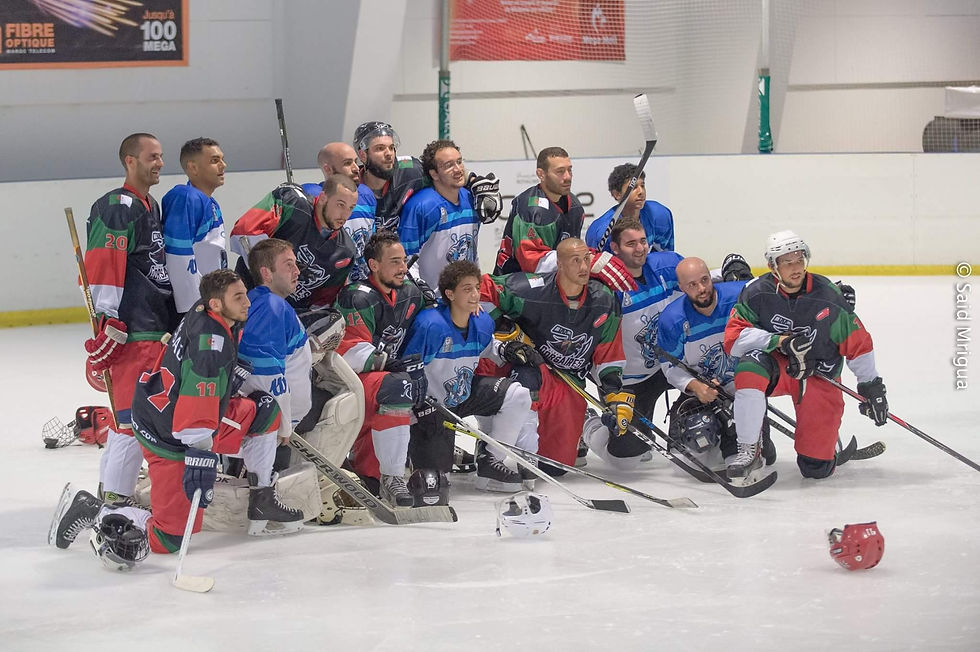Egyptian Club Team Participates First International Ice Hockey Tournament
- Jul 31, 2016
- 3 min read
Updated: Sep 11, 2021
http://www.iihf.com/home-of-hockey/news/news-singleview/?tx_ttnews%5Btt_news%5D=10959&cHash=94863ae01768d0e8610c71cc5ec31f4b

RABAT – With 35°C (95°F) announced today in the Moroccan capital of Rabat, ice hockey may not be the first thing to come in mind for locals and tourists walking through the royal city. But going to the cool ice rink at Mega Mall is exactly what six hockey teams from North Africa will do this week. For the first time the Royal Moroccan Ice Hockey Federation will organize the African Ice Hockey Cup for club teams that will take will start tonight in two groups of three teams followed by the semi-finals on Thursday and the medal games on Saturday. An all-star skills contest will additionally be staged in Casablanca. This new competition and format gives many players and their six club teams from four countries the first chance to compete across their borders in a region where ice hockey is in its early development. In Morocco ice hockey is played at malls in the capital of Rabat and a one-hour journey south in Casablanca. The one at Rabat’s Mega Mall is 40 on 20 metres and allows playing 3-on-3 games for the African Cup. Of the four countries Morocco has reached out the most so far. The national team played in the first and only edition of the Arab Cup organized in 2008 in Abu Dhabi, welcomed teams from France and Spain in Rabat during the past few years, sent peewee teams to Quebec and was part of last year’s World Girls’ Ice Hockey Weekend. The Rabat Capitals, the Casablanca Bears and the Morocco Mallers are the three teams from the host country to play in the event. With the biggest ice rink less than half the international size, not everything is perfect to develop the game in Morocco but the conditions in Rabat may still envy the visitors from the other three North African countries to take part in the event. In Algeria and Tunisia no ice hockey is played and the movement to bring the sport to their countries is led by the diaspora abroad. While there are no competitions in these countries that would allow hockey to grow and give the base to form a national team, the Algerian and Tunisian hockey diaspora convened to form club teams for the tournament in Morocco. The Algiers Corsaires will come together to represent their country in Morocco. It will be the first such game for many of the players since Algeria played in the 2008 Arab Cup. Like eight years ago the team will be led by British-Algerian forward Karim Kerbouche. All team members play abroad as there are only temporary ice rinks during the winter months at best in Algeria. In Tunisia the hockey movement is led from Tunisians abroad, in particular by Ihab Ayed, who normally plays for the Courbevoie Coqs in the fourth tier of French hockey. It’s in the Paris suburb where Ayed organized his Tunisian team’s first game in 2014 that ended with a 6-5 win for the local team. In Rabat the team labelled Carthage Eagles will for the first time play against North African rivals. In Tunisia like in Egypt there are ice rinks but none of them is bigger than 300 square metres, which is one sixth of the area of an international size rink. While the Algiers Corsaires and Carthage Eagles are formed of players from the diaspora in Europe and Canada, the club team from Egypt is actually based in the country where ice hockey competitions take place on the small ice rinks. The Anubis Ice Hockey Team from Cairo will fly from their country to Rabat to become the first Egyptian ice hockey team to play in an international competition abroad. Host Morocco is the only of these countries that is a member of the International Ice Hockey Federation. The continent’s biggest country in ice hockey is 8,000 kilometres away: South Africa where ice hockey has been played since the ‘30s and that has been playing with its national teams in IIHF competitions since 1961. Additionally, neighbouring country Namibia is an affiliate member of the IIHF that has played in inline hockey. MARTIN MERK




Comments